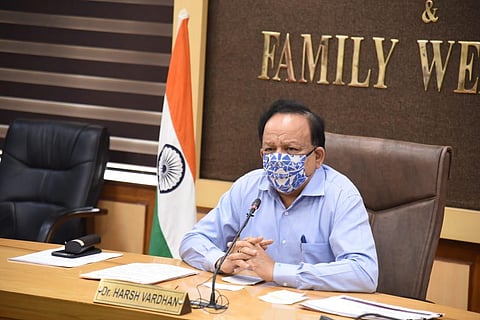

NEW DELHI: Union Health Minister Harsh Vardhan on Tuesday said the eye banking system is among the worst COVID-19 affected routine non-emergency medical activities, with negligible cornea retrievals being conducted in April-May and a shortfall in donations.
The minister, who addressed the 35th National Eye Donation fortnight celebrations and presided over the interactive webinar organised by AIIMS, Delhi and the National Eye Bank, reiterated the advice of the medical community that "it is highly unlikely for the virus to be transmitted via donor corneas", a health ministry statement said.
"Corneal blindness is one of the leading causes of blindness in the world," the statement quoted Vardhan as saying.
Citing the National Blindness and Visual Impairment Survey 2019, he said corneal blindness is the leading cause of blindness among patients aged below 50 in India, accounting for 37.5 pc of the cases, and the second leading cause of blindness among patients aged above 50.
In India, approximately 68 lakh people suffer from corneal blindness in at least one eye.
Of these, 10 lakh people are blind in both eyes, he said.
World Health Organisation (WHO) reports estimate that approximately 5 per cent of the world's population is blind due to corneal diseases alone, Vardhan said.
Since the only known treatment for corneal blindness is corneal transplant, he urged those present at the event to increase awareness to fill the demand and supply gap of corneal tissue, the statement said.
On the shortfall of donations in recent months due to the COVID-19 pandemic and the associated fear, he said, "The eye-banking system has been one of its worst victims among the routine non-emergency medical activities."
"The eye-banking guidelines of various countries, including India, advised temporary suspension of donor cornea retrieval and elective corneal transplantation surgeries when active lockdown measures were being implemented. This led to almost negligible cornea retrieval in April-May with more than 90 per cent fall in corneal transplant surgeries," he said.
Vardhan expressed happiness that eye banking activities have resumed in non-COVID hospitals via the Hospital Cornea Retrieval Programme in India.
He also congratulated the Eye Bank Association of India (EBAI) for coming out with a detailed advisory on precautionary measures with regard to corneal tissue retrieval to ensure maximum safety of tissue recipients and those handling them.
Dr. Jeewan S Titiyal, professor of ophthalmology and chairman National Eye Bank at Dr. Rajendra Prasad Centre for Ophthalmic Sciences, AIIMS said the lockdown measures implemented to contain the spread of the virus have adversely impacted both corneal tissue collection and keratoplasty surgeries.
No tissues were collected during the period from March to July 2020.
Hundreds of patients requiring keratoplasty could not be operated upon.
However, emergency keratoplasty surgeries were performed with previously retrieved glycerin preserved tissues during this period, he said.
"After the temporary halt in corneal tissue retrieval during the lockdown, we have resumed corneal tissue collection via the HCRP (hospital cornea retrieval programme) since July 1. However, the list of the patients awaiting keratoplasty surgery has further increased because of the pandemic," he said.